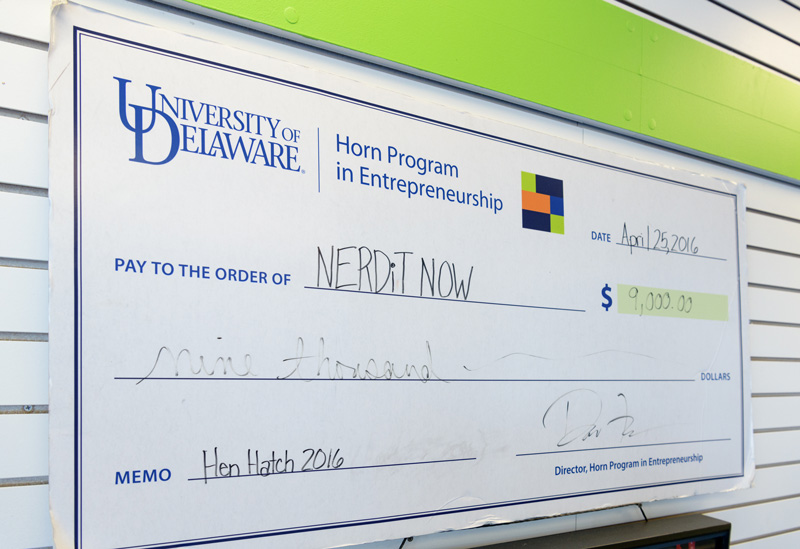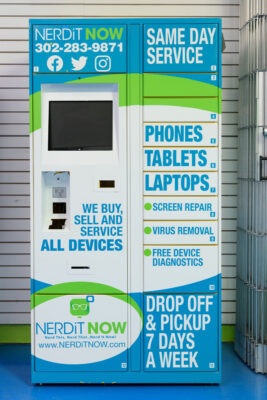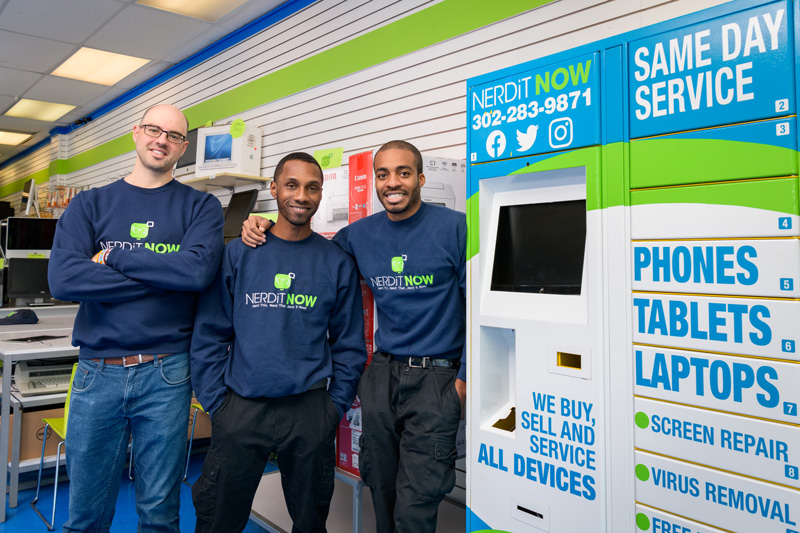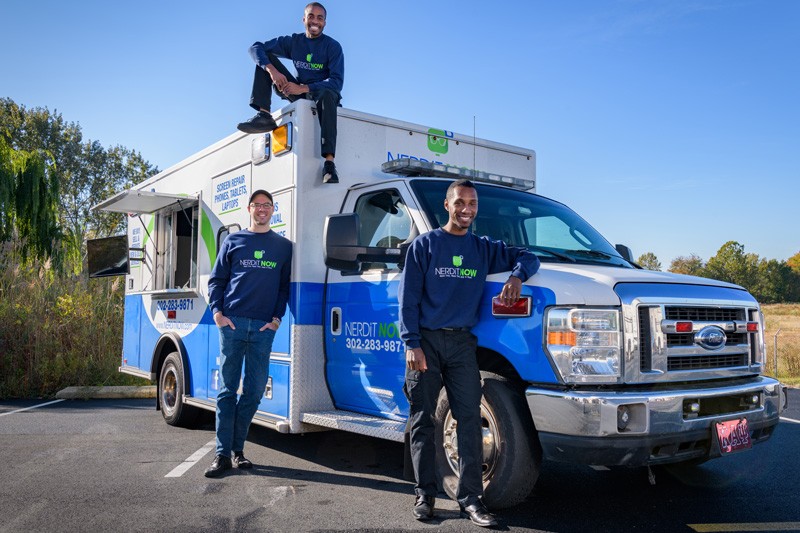Article by Andrea Boyle | Tippett Photos by Evan Krape
Hen Hatch winners will appear on Sunday’s episode of entrepreneurial reality show
Entrepreneur Markevis Gideon strode into ABC Television’s Shark Tank undaunted by the notoriously brutal environment, where small business owners try to convince one of the show’s millionaire investors to support their dreams. Gideon has taken a beating before.
One of the men by his side in “the Tank,” University of Delaware alum Jonathan Hoxter, once knocked out Gideon’s two front teeth.
Granted, they were in daycare at the time. Running from a girl the pair claims liked both of them more than they liked her, they tumbled off a stage and one child’s head smacked into the other’s.
The two brawling toddlers became friends and then business partners in 2015, when they founded their tech repair company, NerdiT Now. NerdiT Now repairs broken phones, computers, tablets and gaming consoles. Users hand over their tech and the NerdiT Now team diagnoses and fixes the issues. They return each item to its owner within hours, often arriving via ambulance.
NerdiT Now’s primary business vehicle is a retrofitted ambulance called “The Motherboard.” Cabinets once filled with medicines, gauze and syringes now house cables, cases and, yes, motherboards. Above a bench where paramedics once rode, a service window has been cut into the side, similar to what you might see in a food truck. The NerdiT Now team travels from place to place setting up shop on site. They have agreements with the owners of small businesses and business parks wherein the ambulance parks outside in the morning. Employees of the businesses drop off their broken personal devices, which are repaired inside the ambulance and available for pick up that same day.

Left to right, Markevis Gideon, Jake Voorhees and Jonathan Hoxter, who run NerdiT Now, stand in front of their retrofitted ambulance, affectionately called “The Motherboard.”
The Motherboard is a gimmick by design.
“We were the 63rd IT company to open in Newark, Delaware. That was going to help us rise above the noise,” Gideon said. Hoxter found a 1986 ambulance on Craig’s List that a Baltimore Ravens’ fan used for tailgating. He purchased it not long before the co-founders entered UD’s Hen Hatch startup funding competition in 2016.
“We thought, all we need to do now is outfit it for what we need,” Hoxter said.
They won second place in the competition’s alumni track, winning $9,000, which they immediately invested in outfitting the vehicle.
“After Hen Hatch, it just broke down,” Hoxter said. “Didn’t work. So, we used a good chunk of that Hen Hatch money and then it just clunked out.”
Hoxter, who graduated from UD’s Lerner College of Business and Economics in 2012 with a degree in finance, is the company’s money man. Showing the resilience of a true entrepreneur, he cobbled together the funds and credit to acquire a second ambulance. And, despite the setback, Gideon, Hoxter and their business partner Jake Voorhees, consider winning Hen Hatch the seminal moment in their business’ trajectory.
“Everyone always asks, what was your first big win? It was this,” Voorhees said, pointing to a large replica of the Hen Hatch check. Voorhees graduated from UD’s College of Engineering in 2009 with a degree in civil engineering. He joined NerdiT Now last year after meeting Gideon through the local business community.

The large replica of the check that NerdiT Now won during a Hen Hatch competition is displayed at the company store.
In April 2019, he and Gideon drove to Louisville, Kentucky to attend an open casting call for Shark Tank. (Hoxter had to work at his day job as a financial analyst in Baltimore.) Each season 40,000 small business owners compete to get on the popular show. Just 88 end up on air, meaning the NerdiT team had a 2.2 percent probability of success.
Gideon, Hoxter and Voorhees chose an alternative perspective, driven by the notion of thinking of the possibility, not the probability. “If you think of the possibility of actually going to Shark Tank, it’s not that scary anymore,” Gideon said.
At midnight on audition day, they realized they needed props, a tactic they used with success at Hen Hatch, which is run by UD’s Horn Entrepreneurship. In the middle of the night, they bought a baseball bat at Walmart and grabbed some broken screens from their car. The next day, they said they felt like they nailed the pitch, but had to wait two weeks to learn they made it to the next round.
Fast forward through multiple rounds of calls and pitches to June, when they received official word the taping would take place just two weeks later. The team knew they wanted to pitch the sharks on the next iteration of their business – the installation of kiosks similar to Amazon lockers. The problem was they didn’t actually own a kiosk.

The NerdiT Now team pitched Shark Tank’s investors on the idea of installing kiosks like this one that would allow easy pick up and drop off of damaged phones, tablets, computers and game consoles.
One arrived expedited from China within 48 hours, was quickly repainted by a local company and within a week was in the back of the ambulance on a cross-country trek to California.
The team can’t divulge much about their time on set but say they were not nervous. They felt comfortable pitching an untested kiosk business model because they know it is how they want to scale up their company. Today, they have one ambulance and one storefront in Newport, Delaware. Within five years they envision 250 NerdiT kiosks at locations ranging from grocery stores and hotels to universities and large businesses. For every 10 kiosks, they plan one ambulance to pick up and drop off devices. Many repairs could take place within the vehicle as it travels.
“Doing a storefront 100 times is very expensive. We want to figure out a way to get to more locations, to build the brand, without having to spend as much money,” Gideon said. The business partners hope to replicate the success of other kiosk businesses such as Redbox, CoinStar and minuteKey.
And, as they succeed, they want to give back. Through the affiliated NerdiT Foundation, they donate more than 100 computers each year to community centers and nonprofits in underserved neighborhoods.
Gideon, who was born to teenage parents, was given a computer by one of his teachers when he was 12. It was an act he said shaped his future.
“If that one computer can change my life,” he said, “how many lives can we change by donating 100 to the community?”
Previously, they purchased computers themselves, but recently developed partnerships with some area companies that pass along lightly used machines. NerdiT refurbishes the computers and donates them locally and to people in the African countries of Ghana and Kenya.

Left to right, Jake Voorhees, Jonathan Hoxter and Markevis Gideon stand next to their kiosk in their store in Newport, Delaware. They hope to eventually have 250 kiosks.
Their generous spirits and positivity seem to elicit similar responses from others. Team members said the staff at Shark Tank was really supportive, even giving the NerdiT guys a standing ovation following their final dress rehearsal, something they were told only happens with child entrepreneurs.
Whether or not they received an investment will be revealed on Sunday, Oct. 27 episode of Shark Tank (airing at 9 p.m. Eastern on ABC). Gideon, Hoxter, Voorhees and their family, friends and supporters plan to gather for a watch party in Wilmington, focused on the possibility, not the probability. Given that they’ve beaten the odds once, both possibility and probability seem huge.

